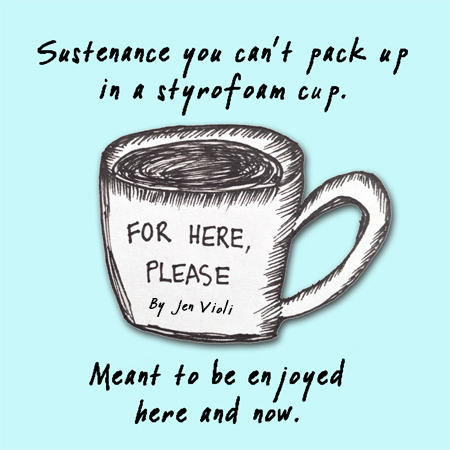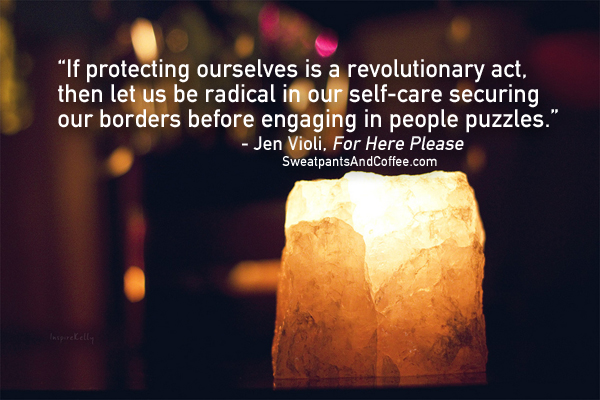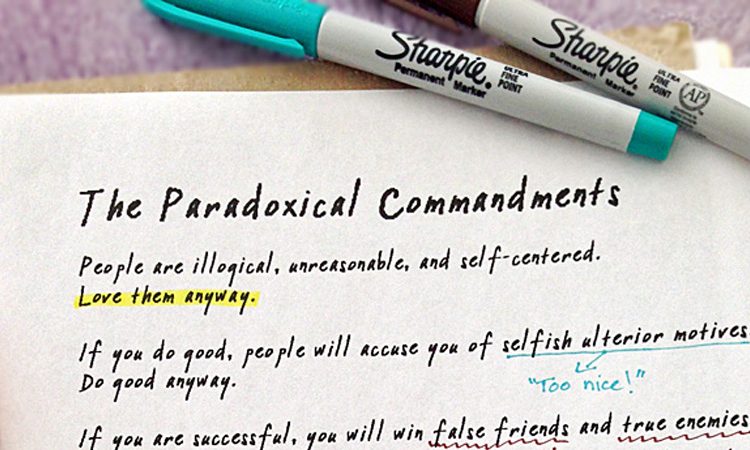
Last week, at the end of my workday, I had these sensations: tension in my neck, shoulders, and face.
Followed by this feeling: the urge to yell and kick something.
Followed by this thought: I’m so tired of other people’s shit.
Followed by this question: Why am I so committed to carrying it around?
Whoa. That question put a hitch in my giddy up. In a good way.
That day, I had witnessed a series of people blasting out complaints, grievances, and stagnant stories. I didn’t feel like I was an objective observer, though. I felt like their angst had gotten into me. Even though at this point, I was alone in my office, I was still twitchy and achy and felt like lashing out.
So I asked my favorite question: why?
I mean shouldn’t my own darling detriments be enough to keep me occupied?
It’s obvious why I take it personally when the upstairs neighbors take out their frustrations loudly on the phone right above me while I’m working. That gets into my space on a sound level and gives me a clear action—go and ask them to keep it down.
But that day, my skin crawled as I heard friends detail fights with other friends, ran into someone with a very vocal laundry list of woes, and my beloved ranted about politics. In all of those cases, I first reached for understanding, my default, even when I know I’m uncomfortable. I jump to well, I can see how they’d feel like that. And hop right over to, we’re all entitled to our own frustrations.
Understanding didn’t ease the situation, and I still wondered, why did I take it all so personally?
One possibility: focusing on other people’s shit allows me to ignore my own, to keep that mess at a good healthy arm’s length away from me.
Other possibilities included that I’m certain someone else’s angst is either
- somehow my fault or
- something I should do something about but have been lazily ignoring.
Those possibilities incited me to tell my ego to Step. Down. It was not all about me. It really wasn’t. Which begged the question, what is about me?
Here’s what I came up with: What I choose to eat. When I rest my eyes or move my body. Where I seek inspiration. Who I engage with. How I spend time and energy. How I treat people.
Not about me? Everything else. That’s a lot not to worry about.

But I struggle, even in my best moments, to set down my long-held stone tablet orders to take care of everyone else. I don’t think I’m the only woman who has acquired such a tablet, which is why I’m writing about this and sharing it with you.
I know I’m not the only woman who has felt her shoulders sag with the weight of world woes, and I want our shoulders to roll back and be free, asap.
Gender aside, I think we all get easily tangled in each other’s business. Humans naturally want to connect, not to mention that we’re encouraged to stay connected, almost constantly—connect on Google, Facebook, Instagram, Pinterest, Verizon. If we’re not connected, how will we know where the blue dot says we should turn next? Whatever you do, don’t lose your connection!
Ugh. I knew if I wanted to stay sane and survive, I had to figure out a way to disconnect. But how to accomplish that act of cultural treason?
Well, I guess telling my ego to back off was a start, but at the end of last week, I still felt disgruntled and unsure how to disconnect.
So I brought the questions with me on retreat, this week, where I am blessedly alone, writing, and unplugged from online connection. From up in a cozy cabin in the trees, I can hear the ocean tide, surfing in a low roar down the hill. Ahhh.
Clarity came, because of course, I had already figured out one way to disconnect. Get away from everyone.
And yet.
Unless I go whole-hermit, which I’m tempted to do but not planning at the moment, that solution was not sustainable. I like the people. The people are amazing. I often want to be with them, so our peopleness can people together. But there has to be a less exhausting way to do it.
In the midst of writing this, I paused to work on the puzzle I brought with me. It’s delightfully titled, “The Untold Story” and has a castle and a goddess and a big lizard, a lion and lotus and flamingos, a pirate ship and polar bear and a candlelight procession. So you know, basically, everything I need. I do this puzzle periodically when I need to reset.
After I set every piece face side up, I separated all of the border pieces I could find and worked on those first. Putting together the edge is so satisfying. All of those clean straight lines to bring order and create a container for the puzzle.
Zap.
Just like that, I remembered what I need to do to solve the puzzle of not getting caught up in other people’s shit, when I’m not embracing hermitude. I have to start with the border. Mine.
I’ve been reading Karla McLaren’s The Language of Emotions, a book with so much useful information and so many essential practices that I know I will reread and reference it for the rest of my life.
I went back to Chapter 10, wherein McLaren describes five empathic skills to “help you create a raft to navigate competently through your emotions, your thoughts, your sensations, and your visions.” The first of these is grounding, and the second is defining your boundaries, that is, your border, made up of all those satisfying edge pieces. McLaren writes,
As you become more skilled at staying present, you’ll begin to notice how many people are uncentered, ungrounded, and unaware—and how hard it is to maintain your focus amid all the commotion. Our culture supports distraction and dissociation at every possible turn; therefore, remaining centered and integrated can be rather difficult. In order to stay focused and grounded, you’ll need protection and definition; you’ll need a sacred space where you can work without interference, and you’ll need a strong and flexible boundary around yourself.
Re-reading those words was about eight kinds of relief. First, confirmation. It is actually hard to maintain a boundary; it is not a culturally supported act. Many people (including me) often carelessly fling emotions (watch out for flying objects!). So it’s not about me being lazy (all the time) or insensitive.
Then came some more relief: I can create that boundary, and I can use my anger to do it.
According to McLaren, healthy anger is what sets a boundary. She writes that when anger comes up, the questions to ask are “What must be protected?” and “What must be restored?”
I love those questions. What a perspective shift.
Maybe I don’t need to bully my repulsion into understanding. Perhaps it’s there for another purpose. Protection.
I remembered that first possibility I entertained—focusing on other people’s shit might be a way of ignoring my own. Yes. It was. How much more productive to use my turmoil to create a boundary, one that happens to be energetically about an arm’s length out all around me—just where I want to keep everyone’s angst, including my own.
If you’re interested in learning how to create your boundary, I highly recommend McLaren’s book, or for starters, check out her blog post, “The Gifts of Anger.” And for now, we can let ourselves be inspired by one of McLaren’s brilliant questions.
This week, your FHP activity, should you choose to accept it, is to, when you get disgruntled by others’ frustrations, use your anger restore the space around yourself. In a few days when I’m back from retreat, I’ll be doing that, too.
This isn’t to say we should ignore others’ pain, that appropriate moments to support won’t arise. It is to say I can’t help anyone (self included), if I’m all stirred up in someone else’s frustration stew. Those things are not about me, and I don’t want them to be. In this case, I mean that last definition of about, as in not around me. Not in my immediate energetic vicinity. I restore and reserve that space for myself.
As McLaren suggests, when you get angry about other people’s crap, ask yourself “What must be restored?” and follow that up with a “how might I restore that?” Pay attention to the answers and take some action.
For instance, when I asked, I realized my serenity balance must be restored. Last week, I needed more breathing room. I over-scheduled and didn’t give myself space to just be in my own skin. First restoration needed? More quiet solo time.
Also, regardless of how many meetings or interactions I have in a day, I can’t be so busy guarding other people’s angst that I forgot my role as Protector of My Space (PMS—wow, that’s a whole other article, don’t you think?), ask for what I need, and take care of myself, i.e.: Can we shift gears? I want to make sure we get a few other things done. Or, Would you excuse me for a moment? I need some air.
Second restoration needed? Manage, voice, and attend to my own needs.
My PMS suit is stiff from lack of wear. I’m not sure it even looks right and I know it feels weird, but none of that is the point. It’s time to be brave and put it on.
If protecting ourselves is a revolutionary act, then let us be radical in our self-care securing our borders before engaging in people puzzles. May this week be a healing and restorative one for all of us.
Photo credit: 
Romantic Nights by Kelly Hunter is licensed under a Creative Commons Attribution 4.0 International License.





Leave a Reply